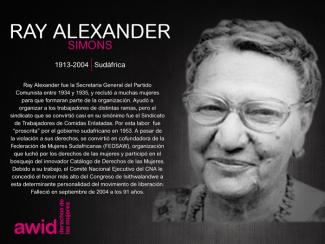
Ray Alexander Simons

In September 2016, the 13th AWID international Forum brought together in Brazil over 1800 feminists and women’s rights advocates in a spirit of resistance and resilience.
This section highlights the gains, learnings and resources that came out of our rich conversations. We invite you to explore, share and comment!
One of the key takeaways from the 2016 Forum was the need to broaden and deepen our cross-movement work to address rising fascisms, fundamentalisms, corporate greed and climate change.
With this in mind, we have been working with multiple allies to grow these seeds of resistance:
And through our next strategic plan and Forum process, we are committed to keep developing ideas and deepen the learnings ignited at the 2016 Forum.
AWID Forums started in 1983, in Washington DC. Since then, the event has grown to become many things to many peoples: an iterative process of sharpening our analyses, vision and actions; a watershed moment that reinvigorates participants’ feminisms and energizes their organizing; and a political home for women human rights defenders to find sanctuary and solidarity.

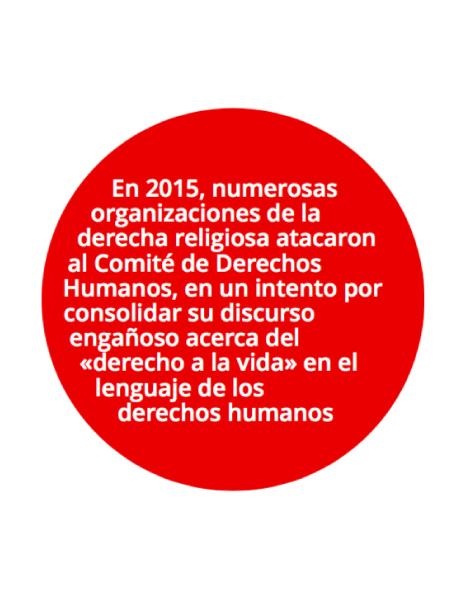
Lxs fundamentalistas religiosos están cada vez más presentes y coordinados en políticas locales, nacionales y regionales. Su incursión arremete contra la vida y la salud de niñas, adolescentes y mujeres, los derechos de la niñez, la libertad de religión y los derechos de las personas LGBTI entre otros.
Lxs fundamentalistas buscan posicionar sus intereses. En el informe Derechos en riesgo puedes comprobar cómo actúan y cómo identificarlos
Este informe es el primero de una serie sobre las tendencias en derechos humanos, producido por la iniciativa Observatorio sobre la Universalidad de los Derechos (OURs en inglés), un proyecto colaborativo que reúne a varias organizaciones y tiene como objetivo monitorear, analizar y compartir información sobre iniciativas anti-derechos.
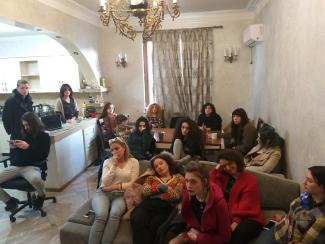
Есть много причин, по которым ваше участие в опросе очень важно. Это возможность поделиться своим опытом привлечения финансирования для деятельности вашей организации; заявить о себе как об эксперте в вопросах движения денежных средств и их получателей; внести свой вклад в коллективную и последовательную адвокацию среди доноров, чтобы привлечь более объемное и эффективное финансирование. За последние два десятилетия исследования AWID в этой области зарекомендовали себя как ключевой ресурс для активисток(-тов) и доноров. Мы приглашаем вас присоединиться к нам в реализации третьей части инициативы «Где деньги?», чтобы осветить реальное состояние ресурсного обеспечения, оспорить ошибочные решения и указать на то, как необходимо изменить финансирование, чтобы движения процветали и реагировали на сложные вызовы нашего времени.
Amal was a prominent politician and parliamentarian in Libya. She was a faculty member at Benghazi University from 1995 until her death in 2017.
Amal was a civil society activist and a member of various social and political initiatives. She assisted the families of martyrs and the disappeared, and was a founding member of a youth initiative called ‘’Youth of Benghazi Libya”. In the 2014 parliamentary elections, Amal was elected to the House of Representatives with more than 14,000 votes (the highest number of votes anyone received in the 2014 elections).
Amal will remain in the memories of many as a woman politician working to ensure a better future in one the most difficult and conflict-ridden contexts in the region.

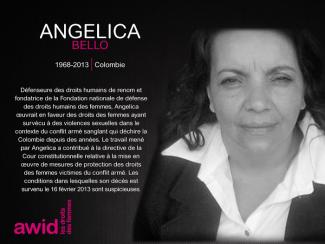
Queremos que hagan de este Foro su realidad feminista: un lugar donde puedan habitar un mundo diferente, al que traigan sus victorias, las soluciones que han creado, lo que lxs hace más fuertes, les da esperanza y les permite seguir adelante. Será una reunión diferente de otras a las que hayan asistido antes.
Lxs invitamos a sumarse a nosotrxs para crear juntxs este mundo. Valdrá la pena hacerlo.
Cada Foro tiene un tema que refleja las necesidades de nuestra membresía y movimientos, y que responde a cómo analizamos el contexto del momento.
Hoy en día los fascismos, fundamentalismos, autoritarismos y el poder empresarial sin restricciones están cobrando cada vez más impulso en el mundo. Vemos cómo estas amenazas convergen con los estados para determinar normas, narrativas y políticas públicas, haciendo que se arraigue una cultura de miedo, odio e incitación a la violencia en el discurso público. Los estados en quienes centrábamos nuestra incidencia y nuestras demandas de derechos, muchas veces ya no se sienten responsables y a veces ni siquiera cuentan con el poder necesario para afirmar derechos.
El Foro AWID 2016 estuvo centrado en los Futuros Feministas y en las condiciones necesarias para hacerlos realidad. En ese momento nos resultó claro que para muchos movimientos por la justicia social pensar soluciones estructurales por fuera del sistema actual constituía un verdadero desafío. Una larga experiencia de desigualdad y opresión puede limitar las posibilidades de la imaginación. Pero lo que también escuchamos en aquel momento y continuamos viendo a nuestro alrededor es que los movimientos feministas ya están viviendo y promoviendo realidades y soluciones centradas en los derechos y la justicia a todos los niveles.
Percibimos la urgencia de movilizarnos desde la esperanza y no en búsqueda de un mínimo común denominador - desde una esperanza apoyada en la certeza de que en todo el mundo, aun con sus imperfecciones, hay experiencias y prácticas que personifican formas más justas de existir y que compartiéndolas, fortaleciéndolas y profundizándolas podemos lograr que alcancen una mayor influencia.
No son sueños imposibles sino realidades que ya estamos viviendo. Esta sensación de posibilidad es una chispa que nos lleva a revisar y volver a valorar las dimensiones transformadoras del trabajo que hacemos.
En AWID entendemos las realidades feministas como ejemplos vivientes de los mundos que sabemos que son posibles. Para nosotrxs, estas realidades feministas proclaman y personifican la esperanza y el poder. Las encontramos en todo lo que nos muestra que existen otras formas de vivir, de pensar y de hacer, desde las expresiones cotidianas que se evidencian en cómo nos relacionamos con otrxs hasta los sistemas alternativos de gobernanza y de justicia. Las realidades feministas son formas de resistencia a sistemas de poder como el patriarcado, el capitalismo y la supremacía blanca.
Son propuestas poderosas que nos orientan hacia la idea de lo que es posible y nos muestran cómo los procesos de organización feminista están abriendo caminos hacia la justicia en movimientos y comunidades de todo el mundo.
En una comunidad negra profundamente marginada de Jackson, Mississippi, Cooperation Jackson lleva adelante un experimento de solidaridad y economía cooperativa. Es un plan ambicioso para desarrollar la propiedad comunitaria por fuera de los modos de producción capitalistas
En África Occidental, mujeres campesinas se están resistiendo a la apropiación de tierras y se niegan a aceptar proyectos de industrialización agrícola, afirmando con orgullo que Nosotras Somos la Solución en una campaña que desarrolla soluciones agroecológicas desde las campesinas y sus conocimientos para alimentar a las comunidades y mitigar el cambio climático
En la India, 5000 mujeres se han unido para desarrollar sistemas de soberanía alimentaria desde las comunidades, basados en los conocimientos locales y que incluyen bancos de cereales y semillas
En México, hay mujeres que han creado un sistema económico sin dinero. En El Cambalache todo tiene el mismo valor: las personas intercambian lo que ya no necesitan por objetos que quieren pero también por conocimientos, habilidades y ayuda mutua. El Cambalache está pensado desde los valores antisistema y anticapitalistas de los movimientos sociales locales
En Rojava, el pueblo kurdo está construyendo una democracia sin estado y las mujeres kurdas ofrecen la Ginología como marco de referencia para cuestionar el patriarcado, el capitalismo y el estado, creando sistemas e instituciones para ponerlo en práctica
En el Reino Unido, las Tías de la Agonía Anarca ofrecen un espectáculo con consejos sobre sexo y citas desde una perspectiva feminista, antifascista y anarquista. Rowan y Marijam están recuperando espacios ganados por la derecha ofreciéndole a un público sobre todo masculino la posibilidad de hacer preguntas difíciles sin ser juzgadxs
El Proyecto Veredictos Africanos Feministas redacta y difunde fallos alternativos en casos africanos decisivos sobre una variedad de temas. Este proyecto nace de una práctica jurídica feminista y propositiva para generar veredictos alternativos y feministas como aporte a la jurisprudencia, la práctica jurídica y la toma de decisiones judiciales de la región.
La Cooperativa Usha, también en India, se creó cuando los bancos tradicionales se negaban a atender a las trabajadoras sexuales en Sonagachi. Ellas se organizaron para crear su propia institución financiera que sirviera a sus intereses. La Cooperativa Usha es un banco cooperativo con más de 20 000 trabajadoras sexuales como socias que en solo un año dio préstamos a 7231 trabajadoras sexuales por valor de USD 4.7 millones. Todas las socias son trabajadoras sexuales. Verdaderamente les pertenece a ellas que son quienes toman decisiones sobre la gestión y dirección de la cooperativa, en un ejemplo pionero de cómo personas y comunidades marginalizadas pueden construir poder econòmico en sus propios términos.
En Puerto Rico, un fideicomiso sobre terrenos comunitarios está transformando un asentamiento en un canal contaminado e inundable en una comunidad sostenible. Constituye un nuevo modelo para urbanizar asentamientos sin que se tornen imposible seguir viviendo allí para sus residentes originales.
En muchos países latinoamericanos hay activistas que ofrecen asesoramiento y acompañamiento entre pares para la realización de abortos con pastillas, reivindicando el derecho de las personas gestantes a decidir sobre sus cuerpos y también al conocimiento médico (por razones de seguridad no incluimos vínculos)
Más sobre estos ejes temáticos
Esperamos que el Foro 2020:
Acentúe el poder de las Realidades Feministas, nombrando, celebrando, difundiendo y entusiasmando con experiencias y propuestas que muestran lo que es posible que ocurra y nutren nuestra imaginación colectiva
Llene nuestros reservorios de esperanza y energía que son tan necesarios para el activismo y la resiliencia por los derechos y la justicia
Fortalezca los vínculos, la reciprocidad y la solidaridad entre los diversos movimientos feministas y con otros movimientos por los derechos y la justicia.
El Foro es más que una reunión de cuatro días. Es una estación en un recorrido más largo para fortalecer nuestros movimientos en torno a la noción de Realidades Feministas que ya ha comenzado y que continuará más allá de las fechas del Foro.
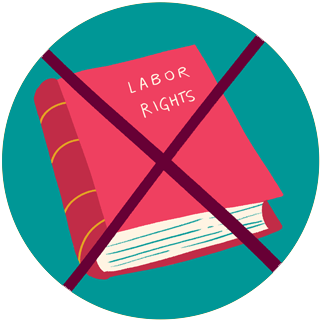
Não, apreciamos muito o vosso trabalho, mas atualmente não solicitamos respostas de fundos feministas e de mulheres. Encorajamos-vos a partilhar o inquérito com os vossos parceires beneficiários e as vossas redes feministas.
Rocky mostró un liderazgo y una dirección inspiradoras en su trabajo con jóvenes lesbianas, gays, bisexuales, transgénero, intersex, queer, y personas transgénero indígenas de Australia (LGBTIQBBSG) en riesgo.
Rocky comenzó su carrera con el Servicio de Policía de Queensland como Oficial de Policía de Enlace. Para ella, hacer una diferencia era algo importante. Desarrolló una carrera impresionante trabajando con jóvenes LGBTIQBBSG como Gerente del Servicio Juvenil de Puertas Abiertas.
Rocky trabajó con lxs beneficiarixs en situaciones complejas, específicamente relacionadas con la identidad sexual y de género. Esta línea de trabajo le resultaba propia: era una líder comunitaria fuerte, una triunfadora discreta, una amiga leal, una persona que apoyaba compasivamente a lxs demás, alguien que producía el cambio. Rocky fue una de lxs fundadorxs de IndigiLez Leadership y de Support Groes.
En 2016, en la Corte Suprema de Brisbane, Michael Kirby, ex juez del Tribunal Supremo de Apelaciones, mencionó por su nombre a Rocky al elogiar el trabajo que el Servicio Legal LGBTI había desarrollado a lo largo de los años. Rocky luchó de forma extraordinariamente tenaz por los derechos humanos de la comunidad LGBTIQBBSG, corrió los límites y produjo cambios de una forma respetuosa y amorosa.


Nous aspirons à faire du Forum de l’AWID un réel rassemblement mondial, où participeront une gamme diverse de mouvements, de régions et de générations. Dans ce but, l’AWID mobilise des ressources pour un Fonds d’accès limité, qui soutiendra les coûts liés à la participation de certaines personnes au Forum.
Le 14ème Forum international de l’AWID se tiendra du 11 au 14 janvier 2020 à Taipei, à Taïwan.
Pour ce Forum de l’AWID, il n’y aura pas de processus de candidature.

En supplément, l’AWID financera la participation d’environ 100 personnes de la région d’accueil du Forum. Les membres des comités du Forum (Contenu et méthodologie, Accès et Accueil) ainsi que les membres du Groupe de travail des artistes recevront aussi un soutien du Fonds d'accès.
Nous avons listé d’autres options pour financer votre participation au Forum de l’AWID sur cette page qui contient des idées de financement.

نعم، يمكن تعبئة الاستطلاع من خلال الهاتف الذكي.
Share your stories and hear from others. By connecting our experiences, narratives and proposals we help co-create and amplify Feminist Realities.